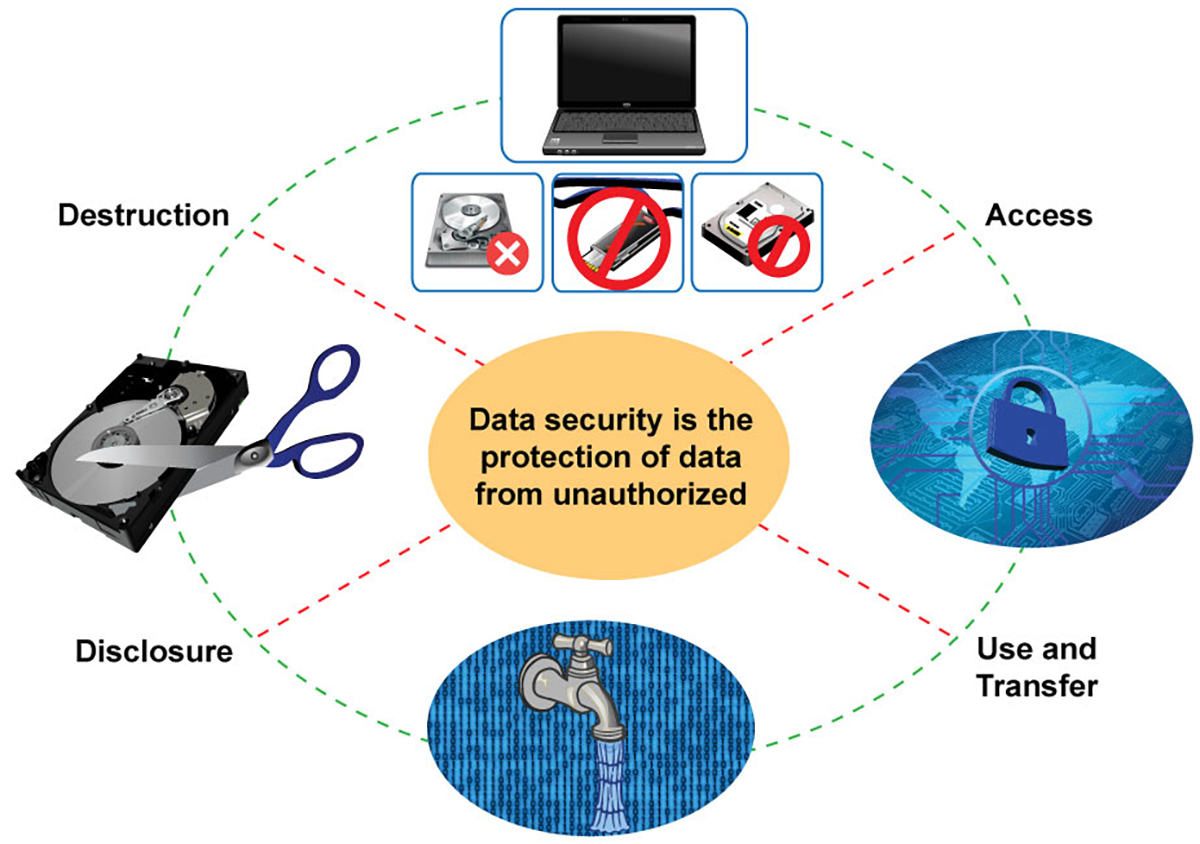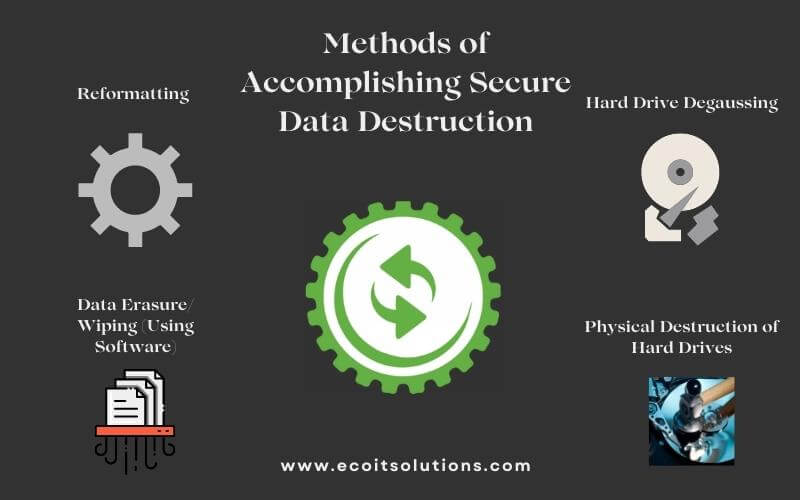Maximizing Cyber Security through Advanced Data Destruction Techniques
Maximizing Cyber Security through Advanced Data Destruction Techniques
Blog Article
The Important Nature of Information Devastation in Upholding Computer Security Solutions and Protecting Against Unauthorized Accessibility
In an age where data violations and identification theft are increasingly widespread, the relevance of reliable data damage can not be overstated. Various techniques, from data cleaning to physical damage, offer as essential safeguards against unauthorized gain access to.
Relevance of Information Devastation
In an increasingly digital world, the importance of information destruction can not be overemphasized. As organizations generate vast amounts of delicate information, the potential effects of failing to effectively get rid of and take care of of that information become increasingly extreme. Data breaches, identity burglary, and company espionage pose substantial risks, underscoring the requirement of efficient information destruction practices.

Furthermore, as technology advances, so too do the methods by which harmful stars look for to manipulate sensitive info. Organizations should remain vigilant and proactive in their data devastation techniques to safeguard versus these evolving risks. By focusing on data destruction, business not just safeguard their possessions but likewise foster count on amongst customers and stakeholders, showing a dedication to responsible data monitoring and safety methods.
Methods of Effective Data Damage
To guarantee the irreparable and total damage of sensitive data, organizations can utilize a range of efficient approaches tailored to their certain requirements. One of one of the most common techniques is data cleaning, which involves using specialized software application to overwrite existing data several times, making recuperation practically impossible. This is especially helpful for disk drives and solid-state drives, where typical removal approaches are insufficient.
An additional effective technique is degaussing, which makes use of solid magnetic fields to disrupt the magnetic domain names on storage space media, making the data irretrievable. This approach is specifically fit for magnetic storage gadgets, such as disk drive and hard drives.
Physical damage is also a viable alternative, involving the shredding, crushing, or incineration of storage space tools. This technique warranties that information can not be recuperated, making it perfect for companies handling highly sensitive details.

Conformity With Data Security Regulations
Organizations must not only concentrate on effective data damage techniques however also guarantee compliance with data defense policies that regulate exactly how sensitive info is dealt with and dealt with. Sticking to these regulations is necessary for protecting personal information and maintaining customer trust. Rules such as the General additional resources Information Security Policy (GDPR) in the European Union and the Health Insurance Mobility and Responsibility Act (HIPAA) in the United States enforce strict guidelines on information management, that include needs for the safe and secure disposal of sensitive information.
To achieve compliance, organizations must execute comprehensive data devastation policies that align with these lawful structures. This consists of identifying information that needs destruction, developing protocols for secure methodsâEUR" such as shredding physical media or utilizing software that satisfies sector standards for information wipingâEUR" and keeping in-depth documents of destruction activities. Normal audits should be conducted to make sure adherence to these policies and to identify any possible locations for enhancement.
Failing to abide with information protection policies can cause substantial lawful ramifications, consisting of substantial fines and damages to an organization's credibility. Consequently, integrating compliance right into data destruction methods is not only a lawful obligation yet likewise an essential element of a robust details safety and security technique.
Consequences of Poor Information Handling
Poor data handling can bring about serious consequences that extend beyond immediate operational obstacles. Organizations might face substantial monetary losses because of data breaches, which often cause costly removal initiatives, legal fees, and regulative fines. These economic effects can stress resources and impede growth, ultimately influencing an organization's lower line.
In addition, bad information handling can seriously harm a company's credibility. Companions, stakeholders, and clients might lose rely on an entity that stops working to safeguard sensitive information, causing reduced consumer loyalty and potential loss of company opportunities. This erosion of count on can take years to restore, if it can be recovered whatsoever.
Furthermore, companies could deal with lawful implications developing from non-compliance with data defense guidelines. Such violations might lead to examinations and penalties, intensifying the financial concern and further tarnishing the organization's photo.
In the realm of cybersecurity, inadequate data monitoring methods can produce susceptabilities that make my response systems a lot more susceptible to unapproved access and cyberattacks. Inevitably, these effects emphasize the critical you can try this out relevance of executing robust data dealing with procedures to protect sensitive information and maintain business integrity.
Ideal Practices for Secure Information Disposal


To start with, information need to be identified according to its level of sensitivity. Delicate information calls for more rigorous disposal techniques, such as shredding physical files and making use of sophisticated software for electronic data cleaning. Employing licensed data destruction services ensures conformity with market guidelines and requirements.
Second of all, organizations need to apply a data disposal plan that mandates routine audits. This plan needs to outline the procedures for data retention and devastation, making certain that out-of-date data is taken care of without delay and securely. Training employees on these methods is important to promoting a culture of safety and security understanding.
Last but not least, maintaining in-depth documents of disposed data enhances liability and supplies a clear audit trail. This documents needs to include the sort of data ruined, the approach utilized, and the date of disposal.
Final Thought
Adopting durable approaches such as information wiping, degaussing, and physical devastation, along with compliance with regulations like GDPR and HIPAA, is necessary for protecting sensitive details. Neglecting proper data disposal practices can lead to extreme consequences, including information breaches and lawful repercussions.
In an era where information violations and identification theft are progressively common, the importance of reliable data devastation can not be overstated. data destruction. Information breaches, identification burglary, and company reconnaissance posture considerable risks, underscoring the requirement of effective data damage methods
Conformity with policies such as GDPR and HIPAA requireds that companies apply stringent data defense steps, including the safe and secure devastation of information at the end of its lifecycle.
By prioritizing data devastation, business not only secure their possessions yet additionally foster trust fund among clients and stakeholders, showing a commitment to liable data monitoring and safety techniques.
Organizations have to not only concentrate on effective information damage methods yet also make sure compliance with information defense policies that govern just how sensitive details is handled and disposed of.
Report this page